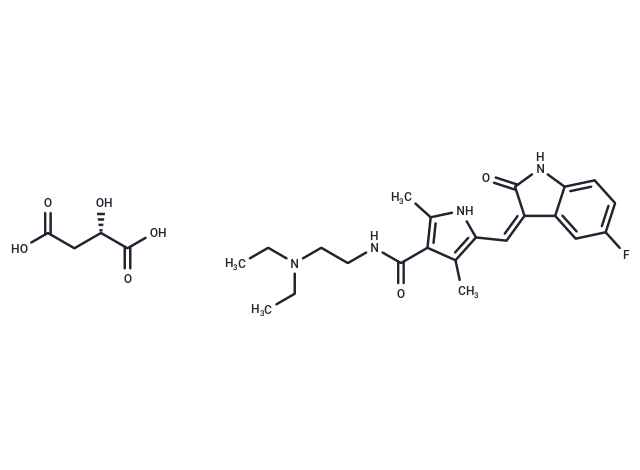Shopping Cart
Remove All Your shopping cart is currently empty
Your shopping cart is currently empty
Sunitinib Malate (Sunitinib) is an indolinone-based tyrosine kinase inhibitor. It blocks the tyrosine kinase activities of VEGFR2, PDGFRβ (IC50: 80/2 nM), and c-kit.

| Pack Size | Price | USA Warehouse | Global Warehouse | Quantity |
|---|---|---|---|---|
| 25 mg | $30 | In Stock | In Stock | |
| 50 mg | $37 | In Stock | In Stock | |
| 100 mg | $50 | In Stock | In Stock | |
| 500 mg | $79 | In Stock | In Stock | |
| 1 g | $113 | In Stock | In Stock | |
| 1 mL x 10 mM (in DMSO) | $50 | In Stock | In Stock |
| Description | Sunitinib Malate (Sunitinib) is an indolinone-based tyrosine kinase inhibitor. It blocks the tyrosine kinase activities of VEGFR2, PDGFRβ (IC50: 80/2 nM), and c-kit. |
| Targets&IC50 | PDGFRβ:2 nM (cell free), VEGFR2:80 nM (cell free) |
| In vitro | Sunitinib is also a good inhibitor of KIT and FLT-3 [1]. In biochemical assays, Sunitinib exhibits competitive inhibition (with regard to ATP) against Flk-1 and PDGFRβ with Ki values of 9 nM and 8 nM, respectively. Sunitinib is also a competitive, albeit less potent, an inhibitor of FGFR1 tyrosine kinase activity, with a Ki value of 0.83 μM. In these biochemical assays, the IC50 values for Sunitinib are generally at least 10-fold higher than those for Flk-1 and PDGFR (e.g., IC50s: >10 μM for EGFR and Cdk2; 4 μM for Met; 2.4 μM for IGFR-1; 0.8 μM for Abl; 0.6 μM for Src) [2]. In RS4;11 cells (FLT3-WT), treatment with Sunitinib inhibits FLT3-WT phosphorylation in a dose-dependent manner with IC50 of approximately 250 nM. In MV4;11 cells that express FLT3-ITD, Sunitinib inhibits FLT3-ITD phosphorylation in a dose-dependent manner with an IC50 of 50 nM following a 2-hour treatment [3]. |
| In vivo | Sunitinib (80 mg/kg/day) inhibits the growth of established SF763T and Colo205 tumor xenografts in athymic mice. Sunitinib treatment effectively inhibits the growth of established tumor xenografts[2]. Sunitinib malate is an inhibitor of VEGFR, PDGFR, FGFR, and is used in the treatment of advanced renal cell carcinoma and gastrointestinal stromal tumors. Sunitinib malate-treated rats display much lower levels of tumor growth than untreated rats, and their tumors have much smaller necrotic areas and lower vascular density [4] |
| Kinase Assay | Ki values for Sunitinib against Flk-1, PDGFRβ, and FGFR1 are determined using glutathione S-transferase-fusion proteins containing the complete cytoplasmic domain of the RTK. Cellular assays to directly determine the ability of Sunitinib to inhibit ligand-dependent RTK phosphorylation or cell proliferation and mitogenic responses are performed using serum-starved cells stimulated with 40 ng/mL VEGF165 (Flk-1/KDR), 0.5 μg/mL basic FGF (FGFR), or 50 ng/mL PDGF-AA (PDGFRα) or PDGF-BB (PDGFRβ) [2]. |
| Cell Research | RS4;11 and MV4;11 cell lines are starved overnight in medium containing 0.1% FBS prior to addition of Sunitinib (1-500 nM) and FL (50 ng/mL; FLT3-WT cells only). Proliferation is measured after 48 hours of culture using the Alamar Blue assay in triplicate for each condition, as described by the manufacturer. Trypan blue cell viability assays are performed in parallel and yielded similar results [3]. |
| Animal Research | Female nu/nu mice (8-12 weeks old, 25 g) are used. Briefly, 3-5×106 tumor cells are implanted s.c. into the hind flank region of mice on day 0. Daily treatment of tumor-bearing mice with oral administration of SU11248 as a carboxymethyl cellulose suspension or as citrate buffered (pH 3.5) solution is initiated once the tumors reached the indicated average size. Tumor growth is evaluated based on the twice-weekly measurement of tumor volume. Typically, studies are terminated when tumors in vehicle-treated animals reach an average size of 1000 mm3 or when the tumors are judged to adversely affect the well being of the animals [2]. |
| Synonyms | Sutent, Sunitinib, SU 11248 (Malate), SU 11248 |
| Molecular Weight | 532.56 |
| Formula | C26H33FN4O7 |
| Cas No. | 341031-54-7 |
| Smiles | O[C@@H](CC(O)=O)C(O)=O.CCN(CC)CCNC(=O)c1c(C)[nH]c(\C=C2/C(=O)Nc3ccc(F)cc23)c1C |
| Relative Density. | 1.229g/cm3 |
| Color | Yellow |
| Appearance | Solid |
| Storage | In solvent: -80°C for 1 year | Shipping with blue ice/Shipping at ambient temperature. | ||||||||||||||||||||||||||||||
| Solubility Information | H2O: 10 mg/mL (18.78 mM), Sonication is recommended. DMSO: 15.47 mg/mL (29.05 mM), Sonication is recommended. | ||||||||||||||||||||||||||||||
| In Vivo Formulation | 10% DMSO+40% PEG300+5% Tween 80+45% Saline: 1 mg/mL (1.88 mM), Sonication is recommended. Please add the solvents sequentially, clarifying the solution as much as possible before adding the next one. Dissolve by heating and/or sonication if necessary. Working solution is recommended to be prepared and used immediately. The formulation provided above is for reference purposes only. In vivo formulations may vary and should be modified based on specific experimental conditions. | ||||||||||||||||||||||||||||||
Solution Preparation Table | |||||||||||||||||||||||||||||||
H2O/DMSO
DMSO
| |||||||||||||||||||||||||||||||
| Size | Quantity | Unit Price | Amount | Operation |
|---|

Copyright © 2015-2026 TargetMol Chemicals Inc. All Rights Reserved.